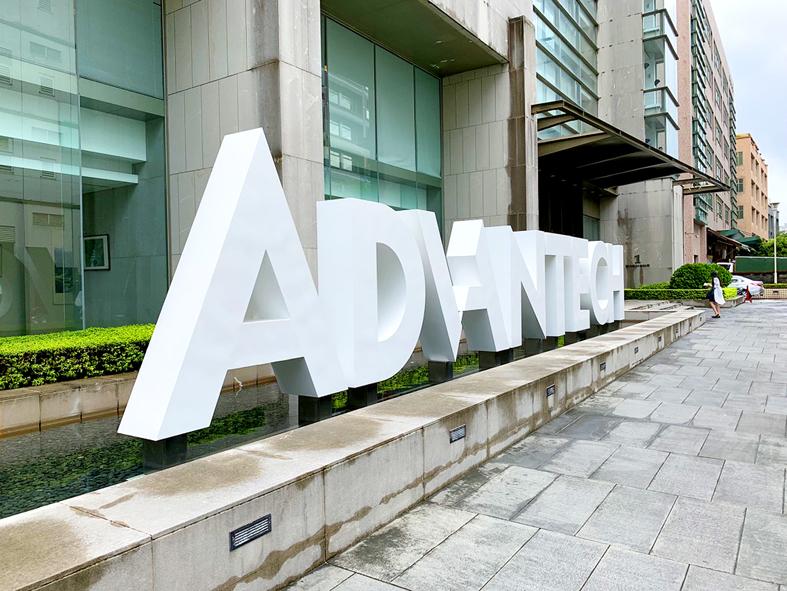Leading industrial PC maker Advantech Co (研華) on Friday reported record revenue and profit for this year’s first quarter, but said component shortages, as well as COVID-19 lockdowns and logistics constraints in China, would affect its revenue outlook in the second quarter.
“Benefiting from steady recovery from major markets and strong demand for new energy such as electric vehicles, solar and wind power, Advantech continuously outperformed in the first quarter of 2022,” Advantech chief financial officer and Eric Chen (陳清熙), who is also president of general management, said in a statement.
The company said its book-to-bill ratio remained high at 1.36 percent from January to March, and the overall delivery lead time is gradually improving, thanks to improving product sales amid a recovery in global demand.

Photo: CNA
Advantech stands to benefit from smart factory upgrades driven by new infrastructure projects, with robust demand from renewable power and electric vehicle sectors, analysts said.
First-quarter revenue was NT$16.12 billion (US$546.81 million), up 2 percent quarterly and 22.5 percent annually, as the company’s embedded Internet of Things (IoT) group, applied computing group and service-IoT group reported strong sales in the first quarter, while the cloud-IoT group saw sales slightly decline partly due to component shortages, Advantech said.
North America and Europe registered sales growth of 32 percent and 31 percent from a year earlier respectively, while emerging markets recorded 70 percent rise during the three-month period, it said.
Net profit last quarter totaled NT$2.57 billion, up 13 percent from the previous quarter and 34 percent higher than a year earlier, it said.
Gross margin was 38.2 percent last quarter, compared with 38.11 percent in the previous quarter, but down from 39.58 percent a year earlier.
Earnings per share were NT$3.32, compared with NT$2.93 the previous quarter and NT$2.48 a year ago, company data showed.
Given a notable demand recovery, the company had planned to expand capacity by 30 percent by the end of last year, with new capacity likely to come online next year at the earliest.
Second quarter demand is expected to be solid based on new business opportunities in applications related to factory automation and energy conservation.
“However, the impacts from component shortages, the Kunshan lockdown last month and logistics constraints remain, which might affect second-quarter revenue by 8 percent to 10 percent,” as shipments would be delayed until later this year, Chen said.
“Advantech will leverage our capacities in Linkou [Taiwan] and Kunshan [China] to minimize overall impacts and maintain operational stability,” he said.

‘SWASTICAR’: Tesla CEO Elon Musk’s close association with Donald Trump has prompted opponents to brand him a ‘Nazi’ and resulted in a dramatic drop in sales Demonstrators descended on Tesla Inc dealerships across the US, and in Europe and Canada on Saturday to protest company chief Elon Musk, who has amassed extraordinary power as a top adviser to US President Donald Trump. Waving signs with messages such as “Musk is stealing our money” and “Reclaim our country,” the protests largely took place peacefully following fiery episodes of vandalism on Tesla vehicles, dealerships and other facilities in recent weeks that US officials have denounced as terrorism. Hundreds rallied on Saturday outside the Tesla dealership in Manhattan. Some blasted Musk, the world’s richest man, while others demanded the shuttering of his

TIGHT-LIPPED: UMC said it had no merger plans at the moment, after Nikkei Asia reported that the firm and GlobalFoundries were considering restarting merger talks United Microelectronics Corp (UMC, 聯電), the world’s No. 4 contract chipmaker, yesterday launched a new US$5 billion 12-inch chip factory in Singapore as part of its latest effort to diversify its manufacturing footprint amid growing geopolitical risks. The new factory, adjacent to UMC’s existing Singapore fab in the Pasir Res Wafer Fab Park, is scheduled to enter volume production next year, utilizing mature 22-nanometer and 28-nanometer process technologies, UMC said in a statement. The company plans to invest US$5 billion during the first phase of the new fab, which would have an installed capacity of 30,000 12-inch wafers per month, it said. The

MULTIFACETED: A task force has analyzed possible scenarios and created responses to assist domestic industries in dealing with US tariffs, the economics minister said The Executive Yuan is tomorrow to announce countermeasures to US President Donald Trump’s planned reciprocal tariffs, although the details of the plan would not be made public until Monday next week, Minister of Economic Affairs J.W. Kuo (郭智輝) said yesterday. The Cabinet established an economic and trade task force in November last year to deal with US trade and tariff related issues, Kuo told reporters outside the legislature in Taipei. The task force has been analyzing and evaluating all kinds of scenarios to identify suitable responses and determine how best to assist domestic industries in managing the effects of Trump’s tariffs, he

Taiwan’s official purchasing managers’ index (PMI) last month rose 0.2 percentage points to 54.2, in a second consecutive month of expansion, thanks to front-loading demand intended to avoid potential US tariff hikes, the Chung-Hua Institution for Economic Research (CIER, 中華經濟研究院) said yesterday. While short-term demand appeared robust, uncertainties rose due to US President Donald Trump’s unpredictable trade policy, CIER president Lien Hsien-ming (連賢明) told a news conference in Taipei. Taiwan’s economy this year would be characterized by high-level fluctuations and the volatility would be wilder than most expect, Lien said Demand for electronics, particularly semiconductors, continues to benefit from US technology giants’ effort